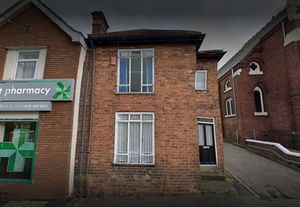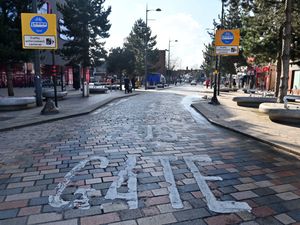The rise of shared homes and the confusing planning laws surrounding them
You may have heard of the term HMO and have a rough grasp of what it means.

The term, abbreviated from the rather cumbersome house in multiple occupation, is often used interchangeably with bedsit or shared accommodation but what exactly they are and the planning rules surrounding them are often clouded in confusion. And just who are the people who live there?
"Does a landlord require planning permission?" and "can we stop them?" are familiar queries.
What is clear is that hundreds have them have been created across the West Midlands over recent years, as houses, offices and former pubs have been converted into multi-room properties by opportunistic landlords.
The number of HMOs has doubled in the last five years and there is now an estimated half a million people living in them in the UK. Some tenants live in HMOs perfectly happily. It works for them and suits their lifestyle as splitting rent five, six or more ways keeps costs low. In many cases, students, young working people or those who have recently arrived in the UK will find themselves in HMOs. But there are major concerns around the lack of regulation of these properties and support for people living there, including those who are vulnerable and have complex needs.
The properties, and the practice of creating and running them, have attracted plenty of controversy. Residents who have been living in their homes for decades have suddenly had to contend with the house next door being converted into shared accommodation and found themselves with half a dozen or more new neighbours.

This has, perhaps understandably, led to concerns about the prospect of what sort of characters these people might be and whether their arrival is likely to result in an increase in crime, noise and antisocial behaviour. Not to mention, they often have revolving doors, with different people coming and going at regular intervals. Despite knowing nothing about the character of these people, it's not surprising this can leave neighbours feeling anxious.
Tenants living in HMOs are also likely to be poorer, and possibly vulnerable, giving them little option to complain or leave if they are not happy with their living conditions, experts say.
When an HMO is proposed, almost universal opposition from neighbours can be expected to follow.
There is also the question of living conditions and the motivation of the landlords running them. There have been stories about cramped living conditions and tenants being crammed into properties by unscrupulous landlords trying to make as much money as possible.
It is fair to say HMOs are something of a grey area when it comes to planning.
In most cases, a small HMO does not require planning permission as it merely a conversion – and the perceived lack of regulation is another reason some people feel uncomfortable about the properties. But larger HMOs, which will be home to seven or more people, do require planning permission. You must also have a licence to rent out an HMO, which is very different to planning permission.
An application is made to a council, who is normally responsible for ensuring they are safe and meet fire standards and have acceptable kitchens and bathrooms. But housing experts have said the threshold to pass these inspections is rarely high, and that there are not enough housing inspectors to keep up.
The matter is complicated further by the fact tsome councils, unhappy with the prevalence of these properties, have enforced what is known as an Article 4 Direction, which throws these planning freedoms out of the window and instead leaves applications at the discretion of the local authority.
Unsuspecting landlords have fallen into the trap of having their licence application accepted in an Article 4 area only then to have planning permission refused.
Research by the Express & Star found their had been dozens of HMO notifications or applications made to Black Country councils over the last five years.
Wolverhampton Council is among authorities to have introduced an Article 4 direction.
Its HMO planning guidance document stated there was "concern about the proliferation of HMOs in Wolverhampton because they give rise to antisocial behaviour and cause a fear of crime", adding "police evidence is that crimes are more likely to be committed in HMOs that other tenures in Wolverhampton".
And it appears the toughening of regulations in the city has had an impact. Of six HMO applications decided last year by the city council, half were refused.
Noise, disturbance and impact on nearby residents were among reasons given, as well as pressure applied by police.
Last year, the Express & Star reported how the former Rollers Arms pub in Dudley had been operating as an HMO without the necessary permission since 2015.
Given the fact police say crimes are more likely to be committed in these properties, it makes the lack of regulation around them all the more surprising.
It's a different story down the road in Dudley, where small HMOs do not require planning permission, although the "merits of the proposed extension" can be scrutinised by council planning committees. Still keeping up?
Proposals for an HMO near Dudley town centre, which has sparked concerns from residents and police, came before councillors in recent weeks. The committee had no say on the conversion itself but could rule on certain extensions, potentially opening the door for accusations unhappy councillors could try to block developments they do not want in this way.
West Midlands Police objected to the development on The Parade saying it was already a high crime area and the HMO would result in more demand on their resources. Planning documents showed police objected due to a "lack of a management plan, no communal room, parking issues, increase in police demand, fear of crime".
Similar concerns were raised by officers about a conversion on Albion Street, Brierley Hill, but the application was waved through despite the efforts of police.
David Jamieson, who was West Midlands Police and Crime Commissioner until standing down last month, has called for tougher regulation of HMOs.
He said earlier this year: "Regulation of this type of housing needs to come from central government, and fast. Currently the law is letting a lot of people down when it comes to this type of housing."
It could be argued interventions like this from the police put pressure on planning bosses who, under planning laws, have no say over the creation of HMOs if not in an Article 4 area.

Councillor Simon Phipps, regeneration boss at Dudley Council, has suggested the authority will consider new policies ensuring housing developments are "suitable" and of "high-quality".
When asked about HMOs, he said: "The council remains committed to ensuring a high-quality and well-balanced mix of housing is available for the borough’s residents.
"Where we can, we will always look to make sure that housing is suitable for its location and surroundings, and over the next few years develop our policies and processes to encourage many more high quality, and attractive housing developments across the borough."
Stephen Iafrati, from the University of Wolverhampton, who has conducted extensive research on HMOs, including speaking to tenants about their experiences, described the properties as the "last resort for housing".
He said the ease of which HMOs can be created and the returns to be made on investment means there is little incentive for landlords to ensure they are maintained.
He said: "I don't want to tar them all with the same brush but they can be a magnet for criminal activity, such as antisocial behaviour, drinking, partying and drug dealing. There is also the more hidden aspect to this, fuelling modern day slavery for instance. HMOs are a key area they can be accommodated, as well as sexual exploitation.
He continued: "It's as if everyone is being pushed down a rung on the housing ladder and those at the bottom are being pushed off completely into the low-cost private sector. There is a lack of regulation. Post-austerity there are not enough housing officers to go out and inspect these places. There are just too many."
Professor Iafrati said councils introducing their own policies only risks pushing the problem elsewhere and potentially increasing homelessness. He believes proper regulation and support for tenants is needed.
He said: "You can tighten regulation, tighten the licensing scheme, you can have Article 4 limiting the number of HMOs but the problem is people who need HMOs don't go away.
"Many of these people have complex needs, they are prison leavers or care leavers or people with mental health problems.
"Take somewhere like Park Village in Wolverhampton, which has a lot of HMOs, you have got a disproportionate number people with mental health problems and substance abuse issues, a concentration of vulnerable people. That's the root of many crime and antisocial behaviour issues.

"All you are doing is pushing the problem somewhere else. Where are these people going to live? There is not enough social housing.
"The solution is supported tenancies. We need more housing from housing associations so people become more stable. What we need are services to support these people."
The housing charity Shelter is unequivocal in its views on HMOs and is calling for tighter regulation.
Chief executive Polly Neate said: "Historically, some of the worst conditions and examples of overcrowding in rented housing have been in homes of multiple occupation.
"Unscrupulous landlords can take advantage of desperate renters struggling to a keep a roof over their heads, by cramming tenants into housing that doesn't even meet basic standards.
"That's why we need a national register for landlords as part of the Renters Reform Bill to hold landlords to account and make renting fairer for tenants."
The National Residential Landlords Association believes the criticism levelled at HMOs and their landlords is unfair and that the majority are responsible.
A spokesman said: "HMO properties are already more heavily regulated than the rest of the sector. The HMO management regulations are designed to ensure these properties have higher safety standards and the vast majority of responsible landlords follow this.
“Rather than restricting supply of properties while many are struggling to find accommodation, local authorities should be properly enforcing these higher standards and taking action against the small number of criminal landlords ignoring their obligations.
"Local authorities have a large number of existing enforcement powers to address anti-social behaviour or property standards and they should use them instead of reducing the supply of homes to tenants.
“The NRLA believes an active enforcement policy that supports good landlords is crucial as it will remove those who operate illegally and create a level playing field. This is to ensure there is a healthy private rented sector that provides a variety of housing types to meet the needs of both residents and landlords in the local area.”





